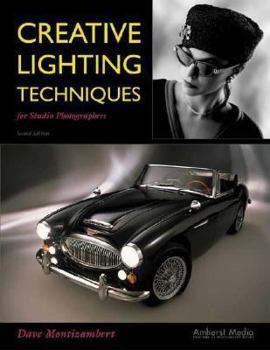Creative Lighting Techniques for Studio Photography
Select Format
Select Condition 
Book Overview
This definitive guide to studio lighting explains and demonstrates universal lighting principles that help photographers think on their feet and master lighting theory and technique. Explained are... This description may be from another edition of this product.
Format:Paperback
Language:English
ISBN:158428093X
ISBN13:9781584280934
Release Date:March 2003
Publisher:Amherst Media
Length:124 Pages
Weight:1.14 lbs.
Dimensions:0.4" x 8.4" x 11.0"
Customer Reviews
5 ratings
Easy read, useful stuff
Published by Thriftbooks.com User , 18 years ago
This book gives you lots of ideas to make studio photography more interesting and versatile without buying expensive equipment. It's easy to read, has lots of tips and lots of lighting diagrams and example photographs. Author tells you what effects you can do without photoshop, and then tells you where photoshop would be useful.
Very clear and useful
Published by Thriftbooks.com User , 18 years ago
The book illustrates the discussion by repeating the same shot with different lighting techniques. You can skim the text and just look at the photos and their lighting diagrams. I found it very informative to see the effects of something as simple as adding or moving a reflective card . This allowed me to take better photos by buying some mat board rather than spend a bunch of money on new lights.
Definately good and usefull
Published by Thriftbooks.com User , 19 years ago
Great book on lightning. A true in-depth manual to studio lightning. While not that usefull to absolute beginners, the book is a "must have" for any studio photographer. Understandable language, true knowledge of specifics - thumbs up for Dave Montizambert!
Great guide for making you think about how to solve problems
Published by Thriftbooks.com User , 19 years ago
This book differs from many other books about photography, lighting and setups. Dave Montizambert provides you with the theory about how to create the desired image. He starts by making sure you think about 'picture making' instead of 'picture taking'. Having this in mind he tells about the options a studio photographer has to create an image from scratch in the studio. As support he uses several cases with a distinct goal and outcome. These cases are well illustrated and the solutions are well described. After reading this book you have a better understanding of how to use light, different forms of light, different uses of studio tools and other stuff that can be used in the studio. It goes beyond the standard books that just show a nice shot and how it is done, actually most shots that Dave Montizambert uses in this book aren't even that good. That is good since it does not distract you from what really counts, learning to think about how to create the desired image.
Don't be left in the dark about lighting
Published by Thriftbooks.com User , 24 years ago
Creative Lighting Techniques for Studio PhotographersDave MontizambertAmherst Media, Inc.110 pages Paperback "What would you do if you were asked to photograph an ice sculpture, or a hand-blown glass perfume bottle, or a glowing mug of beer, or a silverware setting or a brushed steel appliance, or a black car with chrome details?" asks photographer/author Dave Montizambert. If given any of the assignments listed, would you know how to go about lighting the subjects correctly and effectively? Lighting--especially of reflective surfaces--can be tricky. The proper lighting of a surface or subject can a take dull, boring subject and turn it into a prize winning illustration. Proper lighting on your models can turn a so-so portrait into a dramatic statement. Lighting is important, understanding how to use it correctly can make or break your career. I used to think experience, experimentation and a good eye could lead the way to properly lighting a scene or subject. That doesn't always work, however. If you don't know how you got the perfect lighting on your subject, you won't know how to duplicate it if you want that lighting for another subject. You have to know the rules. Creative Lighting Techniques for Studio Photographers explains lighting in clear language and then demonstrates the various techniques with large, clean illustrations. The photographer's vocabulary of lighting terminology is explained and illustrated with equal proficiency. After reading this volume, you will know what specular lighting, edge transfers, diffused values, obstruction distance and separation lighting are. You will understand distant relationships of light to subject and main light to distance (to subject) to ambient ratios. Better than that you will know why and how light works, falls off, changes energy and reflects and how these elements effect your images. Any questions you may have after reading the text and studying the illustrations will probably be answered in the "`Tips' boxes." "Tech Tips" feature additional technical information to help you apply the techniques discussed in the chapter's text. "Quick Reminder" boxes repeat important terms and concepts introduced in each chapter. "Did You Know?" boxes feature even more helpful information concerning the use of techniques just learned. "Data for Frames" boxes tell all about the technical specifications of the images, and includes exposure information, camera, lens and film data. To illustrate the thoroughness of the chapters in this book, I will use the portion "Light Painting 101," from Section Three. The term, "light Painting" is explained; the reader is then referred to a previous page where light painting is being used by a photographer for a commercial shot. Three schematics of the set up are shown, along eight with illustrative photographs. Exact information as to the filters, light sources, props and other equipment are below the phot






